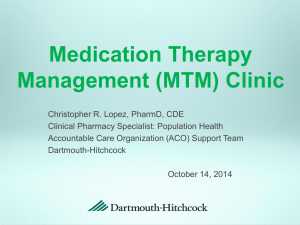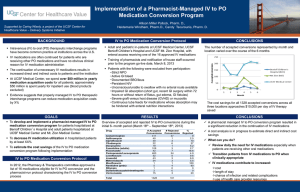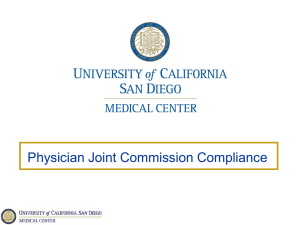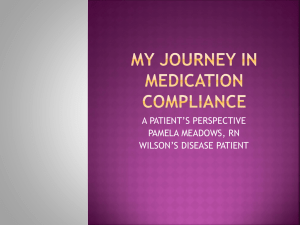Uniform Pain Management Agreement
advertisement
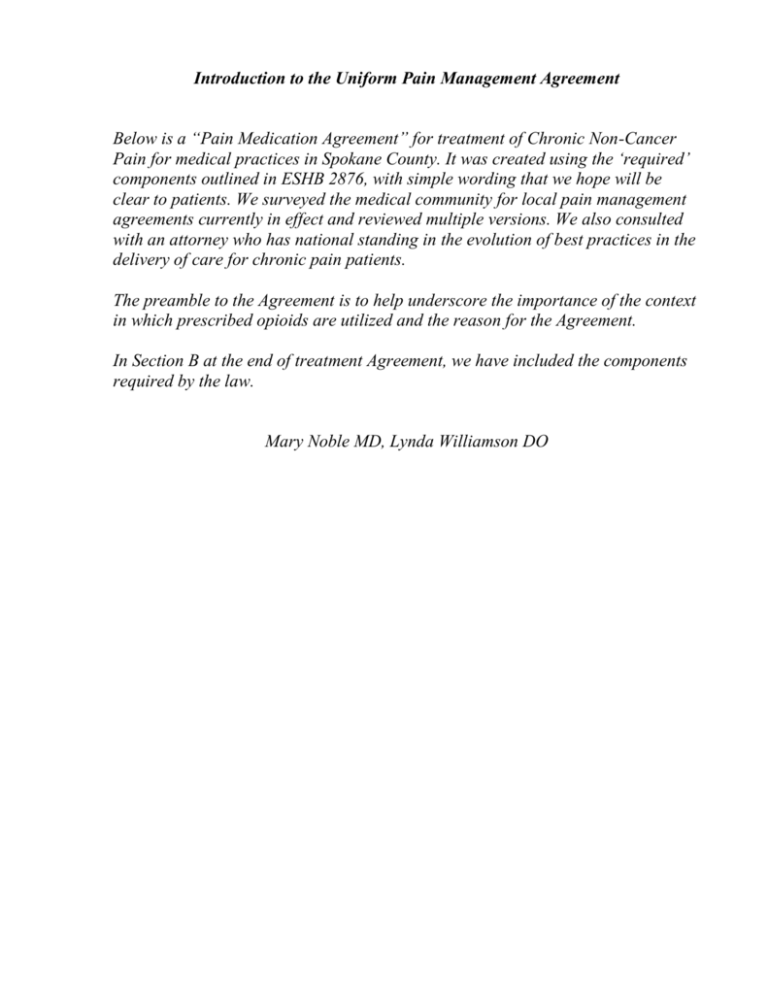
Introduction to the Uniform Pain Management Agreement Below is a “Pain Medication Agreement” for treatment of Chronic Non-Cancer Pain for medical practices in Spokane County. It was created using the ‘required’ components outlined in ESHB 2876, with simple wording that we hope will be clear to patients. We surveyed the medical community for local pain management agreements currently in effect and reviewed multiple versions. We also consulted with an attorney who has national standing in the evolution of best practices in the delivery of care for chronic pain patients. The preamble to the Agreement is to help underscore the importance of the context in which prescribed opioids are utilized and the reason for the Agreement. In Section B at the end of treatment Agreement, we have included the components required by the law. Mary Noble MD, Lynda Williamson DO “Pain Management Agreement” Spokane County Medical Society The management of chronic pain is a complex problem and pain medications may be part of the treatment plan. Opioid pain medications typically only reduce chronic pain by about 30%. Other treatments may be prescribed to help improve function and reduce pain. “Zero pain” may be an unreasonable goal. There are many ways to treat chronic pain beside opioid medications. The purpose of this agreement is to protect the safety of the patient and the community and to clearly establish expectations of how these medications are to be safely managed. These are dangerous medications that are highly regulated and can cause serious injury or death if misused. When you sign this agreement, it means that you understand that taking opioid pain medications, even as prescribed, may trigger craving for more opiates. Dependency and habituation to opioids could put you at risk of developing an addictive disorder. Uniform Pain Management Agreement Spokane County Medical Society Patient:____________________ Physician:______________________________ Patient’s DOB: _____________ Designated Pharmacy: ____________________ 1. _______ONE prescriber for controlled medications and ONE pharmacy: I agree to receive pain medications only from my treating physician (named above) or from someone designated by my treating physician. I agree to receive my pain medications only from my designated pharmacy (listed above) unless my treating physician agrees otherwise. If you receive controlled medications from another health care professional because of a true emergency, injury or accident requiring urgent care, you agree to tell that practitioner (or have a family member/friend tell that practitioner) about your agreement with this office. If you receive controlled medications from another health care professional, you agree to call this office within 24 hours and tell us who prescribed or gave you which controlled medications and why. This requirement is for your safety and allows us to consider possible drug interactions. You also understand that you should use the same pharmacy every time you fill a prescription. You agree to call us if there is a reason to use a different pharmacy. This requirement is also for your safety. 2. ______ Drug testing and medication counts: I give my permission for urine, saliva or blood screening as requested by my treating doctor at any time. I understand that it is my doctor’s responsibility to make sure my treatment plan is safe, effective and that I am following the treatment plan. I understand that a drug screen is a laboratory test of samples of my urine, saliva or blood that I provide to check the drugs that I have been taking. I understand that my drug screening test results will be part of my medical record. I understand that I may be asked to bring in all of my medications at any time to be counted. This is one measure of how well I am able to follow my treatment plan. We use drug testing and pill counts in this practice to look at risk and safety issues. We do not perform drug testing or medication counts to punish you. We do this to monitor risk and safety as required by professional medical guidelines and rules. 3. ______ Take medications ONLY as prescribed. I agree to take each of my medications at the prescribed dose and frequency. This means I will not run out early. If I think my medication is not working, or that I am having a medication problem, I will call this office and ask to speak with my doctor for guidance. Controlled medications are powerful and can cause harm if not taken according to the doctor’s instructions. Using controlled medications in any way other than as directed by your doctor may cause you to have more health problems and could kill you. Follow the written directions on your prescription bottles and call your pharmacist and this office if you have questions. 4. ______ Medication safety: I will safeguard my medications and prescriptions. I understand that lost, stolen or damaged medication will not be replaced. I will store my medications in a safe, secure, locked place to prevent theft, loss or use by others. I will keep all medications away from children of any age. Allowing someone else to take your medication can make another person sick or cause them to die. These medications are prescribed for you and only you. We emphasize the safe use, storage, and disposal of all medication. Use medication ONLY as directed. 5. ______ Is this the right medication for me: I understand that my physician may stop, taper, or change my prescribed medication: -IF my activity and functional level have not improved -IF I do not show improvement of pain -IF I develop significant side-effects from the medication -IF I give, sell or misuse any of my medications -IF I demonstrate that I am unable to follow this agreement and my physician feels she/he can no longer prescribe my pain medications safely and effectively. This will be documented in my medical record. 6. ______ Agreement NOT to use illegal drugs or other pain medications: I agree not to use illegal or street drugs. I agree not to abuse alcohol. I agree not to take any medications prescribed for someone else. I agree not to use over-the-counter medicines or any other medically active substance without the agreement of my treating physician. I may be prescribed medication by another licensed provider and I will notify EVERY treating physician of all medications I am taking. If I am prescribed other or additional pain medications due to surgery or to injury I will notify the health care provider caring for me that I have a pain medication agreement. I will promptly let my pain medicine prescriber know that I have received additional medication. Using illegal or street drugs is a bad idea. Using other medication not prescribed by your pain medicine prescriber to treat your pain or pain-related medical problems is a bad idea. If you use illegal drugs or other controlled medications, your doctor may decide to stop prescribing controlled medications for you. 7. ______ Consent to share this agreement with other health care professionals and the hospital for coordination of my medical care: I give my permission for my treating physician to share the contents of this agreement and to discuss all my medical conditions and treatment details with pharmacists, physicians (including Emergency Departments and Urgent Care Centers), or other healthcare professionals for the purpose of coordinating my care. I give permission for all the above to report violations of this agreement to my physician. I understand that this agreement may be added to my medical record at the hospital so that if I do have an emergency visit, or surgery, my treatment plan will be considered. I understand this is to help keep me safe. I understand that my permission is not required for my physician and my pharmacy to cooperate fully with any city, state or federal law enforcement agency in the investigation of any possible misuse, sale or other diversion of my pain medicine. I agree to waive any applicable privilege or right of privacy or confidentiality with respect to these authorizations. By signing this document, you agree that we can share this agreement with any health care professional in the coordination of your medical care. In this case, coordination of care means the evaluation of your health, medical treatment and safety issues associated with the use of controlled medication. Patient signature ____________________________________ Date_________________ Patient name PRINTED ____________________________________________________ Prescribing Physician signature _____________________________________________ Copy of this signed Agreement to be given to the pt’s chart, the patient, SHMC ED for hospital EMR. Section B: Required Agreement Components Section B: Per ESHB 2876: WAC 246-919-856: Written agreement for treatment: Chronic non cancer pain patients should receive all chronic pain management prescriptions from one physician and one pharmacy whenever possible. If the patient is at high risk for medication abuse, or has a history of substance abuse, or psychiatric comorbidities, the prescribing physician shall use a written agreement for treatment with the patient outlining patient responsibilities. This written agreement for treatment shall include: 1. The patient's agreement to provide biological samples for urine/serum medical level screening when requested by the physician. see #2 2. The patient's agreement to take medications at dose and frequency prescribed with a specific protocol for lost prescriptions and early refills. see #3 3. Reasons for which drug therapy may be discontinued (e.g. violation of agreement). see #5 4. The requirement that all chronic pain management prescriptions are provided by a single prescriber or multidisciplinary pain clinic and dispensed by a single pharmacy or pharmacy system. see #1 5. The patient's agreement to not abuse alcohol or use other medically unauthorized substances. see #6 6. A written authorization for: (a) The physician to release the agreement for treatment to local emergency departments, urgent care facilities and pharmacies. see #7 (b) Other practitioners to report violations of the agreement back to the physician see #7 (c) A written authorization that the physician may notify the proper authorities if he or she has reason to believe the patient has engaged in illegal activity see #7 (d) Acknowledgement that a violation of the agreement may result in a tapering or discontinuation of the prescription see #5 and #6 (e) Acknowledgement that it is the patient's responsibility to safeguard all medications and keep them in a secure location. see #4 (f) Acknowledgement that if the patient violates the terms of the agreement, the violation and the physician's response to the violation will be documented, as well as the rationale for changes in the treatment plan. see #5
